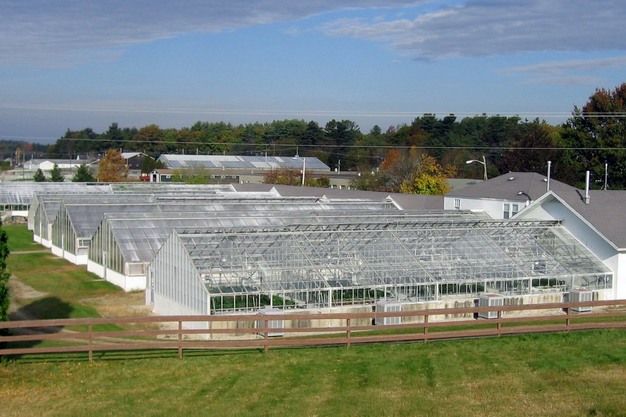The New Hampshire Agricultural Experiment Station (NHAES) is hosting its Macfarlane Research Greenhouses Open House on Saturday, April 6, from 9 – 3 p.m. This longtime annual event—which is free and open to the public—highlights the research and work of NHAES scientists and UNH Extension education specialists.
Guests can explore the various compartments of the Macfarlane Research Greenhouses and learn about some of the research taking place in each, explore and discover how a research greenhouse operates, and meet the researchers working at the facility and the staff who operate it. Additionally, the Open House will feature speakers and a tour of the UNH teaching plant's high tunnels.

Schedule of Events:
- 9 a.m. – Macfarlane Research Greenhouses Open House begins.
- 11 a.m. – UNH Extension presentation: Climate Resilient Gardens: Gardening for Extreme Weather Conditions with Sean O'Brien and Steph Sosinski from UNH Extension's Home Horticulture Program
- 11 a.m. – 1 p.m. – Lunch provided from the Gather food pantry. Lunches are available to all, but donations are encouraged.
- 12 p.m. – Guided tour: Growing Food for Campus: Discovering UNH's Teaching High Tunnels led by Susan Soucy, UNH Horticultural Program Coordinator. Transportation will be provided to the high tunnels (located across from the Fairchild Dairy Teaching and Research Center), however, guests are welcome to also drive themselves.
- 1 p.m. – NHAES presentation: Grow Your Food Year-Round: Leveraging Indoor Food Production Systems for a Bountiful Annual Harvest with Md Sazan Rahman, assistant professor of Agriculture, Nutrition, and Food Systems
- 2 p.m. – NHAES presentation: Growing Sweet Potatoes in the North: How to Succeed with These Delicious Roots with Becky Sideman, chair of COLSA's Agriculture, Nutrition and Food Systems department; professor of Sustainable Agriculture and Food Systems
The Macfarlane Research Greenhouses offers a controlled environment for a diversity of agricultural and floricultural research projects that include ornamental and food crop breeding, sustainable ornamental plant nutrition and development, aquaculture, biological pest control, bioremediation, and plant genetic diversity. The greenhouse environments are monitored and precisely regulated through a computer-based control system that creates a sustainable growing environment through the conservation of heat, electricity, water, and fertilizer and increased plant resistance to insect pests and diseases.
Examples of current and ongoing research taking place at the Macfarlane Greenhouses – research that Open House visitors will have the chance to learn more about – include growing traditional warm-weather plants and using genetics to breed local varieties of strawberries, kiwi berries, Tartary buckwheat, and others.
"We're excited to showcase the research and teaching programs that take place at the Macfarlane Research Greenhouses," said Matt Biondi, research greenhouse manager. "It's an event for science-enthusiasts of all ages, with a research scavenger hunt for children, lunch offered by the Gather NH food pantry, and presentations by researchers and, by Extension, specialists – so definitely bring your questions about gardening, greenhouse growing, and managing plant pests and discover how UNH researchers are working to ensure sustainable, science-based management in the future."
The first greenhouse was built at UNH in 1896 and, in 1948, was moved to the site where the Macfarlane Research Greenhouses now stand. The 22,000-square-foot greenhouses were named in honor of UNH's first greenhouse director, James Macfarlane. Since the establishment of these greenhouses, they've played a critical role in the university's land-grant mission.
"A significant number of the NH Agricultural Experiment Station's agricultural studies begin at the greenhouses, and the facility allows researchers to also study plant breeding and genetics and integrated pest management throughout the winter while also acclimatizing initial plants before they're transplanted in the spring," described Anton Bekkerman, director of the NHAES.
